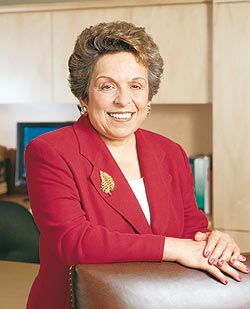
Iran RPCV Shalala on how to make the Drug Plans Work
Making the Drug Plans Work
By Donna Shalala
Monday, December 29, 2003; Page A17
The passage of Medicare prescription drug legislation will present the U.S. Department of Health and Human Services with the biggest challenge it has faced since its inception. HHS, the agency that manages Medicare, has the tough job of transforming a very complicated, ideologically driven piece of legislation into a practical drug benefit that will work for our older and disabled citizens when they go to the pharmacy to get the drugs they need.
The stakes are high. The president and the congressional leadership invested substantial political capital in passing this benefit, and they clearly expect to get credit from seniors and the disabled for addressing an important issue. Whether Medicare beneficiaries will applaud or bemoan it depends in large measure on the decisions HHS makes over the next few months on scores of design and implementation issues.
The agency has much work to do and no real-life examples to look to. Congress, for better or worse, determined that most beneficiaries would receive drug benefits from new, private prescription drug plans. This type of plan does not now exist anywhere in our health care system, and no one can currently say who will offer this coverage or how precisely the plans will operate. The benefits are not fixed, nor is the premium. HHS has a very short time -- realistically about 15 months -- to transform the theory that Congress has put forward into a working market that can provide prescription drug coverage to Medicare beneficiaries.
The agency will have to make literally thousands of decisions as it develops the rules and procedures for this program, many of which will significantly affect beneficiaries and prescription drug plans alike. It will get a strong push from industry groups to write minimal regulations that leave most of the details to the private prescription drug plans. That is largely what Congress did in drafting the law.
In my view, HHS will need to go further and write regulations that establish meaningful minimum standards to protect beneficiaries from potential market abuses. If the department doesn't focus all its efforts on developing a program that beneficiaries understand and that meets their needs, our most vulnerable citizens will not sign up for the new benefit and the program will fail.
Let me offer just two examples of areas where HHS needs to move beyond the minimal provisions in the law to protect legitimate needs of beneficiaries.
The first involves the information that beneficiaries will have when they choose a drug plan. The law apparently does not give beneficiaries access to the preferred drug lists of the competing prescription drug plans before enrollment. Most plans are expected to vary the amount beneficiaries must pay based on whether the drug is on their preferred-drug list. Without access to these lists before enrollment, picking a plan could be a roll of the dice: beneficiaries would have no way to know whether the plan covers the drugs they are taking. HHS must address this deficiency.
A second and more serious example involves ensuring that coverage is adequate to meet the needs of beneficiaries. Although most plans are expected to use preferred drug lists (sometimes called formularies) in their benefit designs, the law provides almost no protection for consumers against potentially abusive practices. Plans are left free to design very restrictive preferred drug lists and may change these lists after a beneficiary enrolls in a plan (despite the fact that the beneficiary is locked into the plan for a year). While plans must provide coverage for drugs from each "therapeutic class" (that is, similar drugs that are intended to treat similar medical conditions), the law does not specify that drugs from each class be on the plan's preferred list, nor does it prevent a plan from varying the cost-sharing amounts for its preferred drugs in different classes. While there are some protections for beneficiaries if they go through an appeal procedure, plans retain substantial latitude to vary cost-sharing by drug class, potentially harming beneficiaries with particular medical conditions.
This all sounds terribly technical, but in fact it matters more to the value of the coverage than almost any other element of this program. HHS must find a way to establish reasonable limits on preferred drug lists or beneficiaries will walk away from the program.
There are other important challenges. Perhaps the most egregious example of where the law may not measure up to its press releases is in guaranteeing the neediest seniors assistance. Although the law offers seniors with incomes below 135 percent of the federal poverty level a full premium subsidy for the average-cost plan in their regions, they will have to navigate unnecessary bureaucratic hoops to get it. The law imposes an "assets test," even though most low-income seniors have very limited assets. The law leaves it up to HHS to coordinate state Medicaid programs and to the Social Security Administration to work with low-income beneficiaries and administer the assets test. It is unclear how they will coordinate their activities.
Unfortunately, the states have a terrible record here. Recent reports indicate that no more than 60 percent of the very lowest-income seniors received Medicare premium assistance they were entitled to under the longstanding Qualified Medicare Beneficiary program. The Social Security Administration is more experienced, but it will have to dramatically ramp up its activities and staffing immediately.
These are but a few examples of what lies ahead. HHS needs to keep its focus squarely on what our older and disabled citizens expect and need from this program if the administration hopes to call this program a success in 2006.
The writer, who was secretary of health and human services from 1993 to 2001, is president of the University of Miami.
